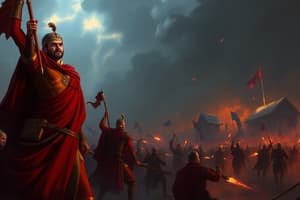Podcast
Questions and Answers
What does the term 'Renaissance' mean?
What does the term 'Renaissance' mean?
- Reform
- Renaissancy
- Rebirth (correct)
- Revolution
What was the significance of the Bible in the context of the printing press?
What was the significance of the Bible in the context of the printing press?
- It was the first book to be illustrated
- It was the first book to be translated into Latin
- It was the first book to be handwritten
- It was the first book to be printed on the printing press (correct)
What is propaganda often used for?
What is propaganda often used for?
- To report on current events
- To educate people on historical events
- To promote a particular political cause or point of view (correct)
- To provide unbiased information
What is the main idea behind laissez-faire economics?
What is the main idea behind laissez-faire economics?
What is the name of the palace built by Louis XIV outside of Paris?
What is the name of the palace built by Louis XIV outside of Paris?
Who invented the mercury thermometer?
Who invented the mercury thermometer?
What is imperialism?
What is imperialism?
Who wrote The Wealth of Nations?
Who wrote The Wealth of Nations?
What is the name of the theory that states the Earth and other planets revolve around the sun?
What is the name of the theory that states the Earth and other planets revolve around the sun?
Who was the Queen of France during the French Revolution?
Who was the Queen of France during the French Revolution?
What is the term for the belief that one race is superior to another?
What is the term for the belief that one race is superior to another?
What was the significance of Pearl Harbor?
What was the significance of Pearl Harbor?
What is the term for a system of governing in which the ruler's power is limited by law?
What is the term for a system of governing in which the ruler's power is limited by law?
Who was the Archduke of Austria-Hungary whose assassination was a major catalyst for World War I?
Who was the Archduke of Austria-Hungary whose assassination was a major catalyst for World War I?
Who invented the cotton gin?
Who invented the cotton gin?
What is the term for a logical, systematic approach to the solution of a scientific problem?
What is the term for a logical, systematic approach to the solution of a scientific problem?
Flashcards are hidden until you start studying
Study Notes
Key Historical Figures
- John Calvin: a religious reformer who believed in predestination and a strict sense of morality for society
- Franz Ferdinand: Archduke of Austria-Hungary assassinated by a Serbian nationalist, a major catalyst for WWI
- Marie Antoinette: Queen of France (as wife of Louis XVI) who was unpopular for her extravagance and opposition to reform, contributing to the overthrow of the monarchy; she was guillotined along with her husband (1755-1793)
- Bismarck: Prussian chancellor who engineered the unification of Germany under his rule, delivered "blood and iron" speech, and practiced Realpolitik
- Adam Smith: wrote "The Wealth of Nations"
- Karl Marx: founder of modern communism, wrote the "Communist Manifesto"
- Charles I of England: English King during the English Civil War, executed by Oliver Cromwell
Inventions and Discoveries
- Gutenberg: invented the printing press
- Fahrenheit: invented the mercury thermometer
- Eli Whitney: invented the cotton gin
- Leeuwenhoek: invented the microscope
Historical Events and Movements
- Renaissance: a movement that centered on the revival of interest in classical learning of Greece and Rome
- English Civil War: a conflict that resulted in the execution of King Charles I of England
- World War I: a global conflict sparked by the assassination of Franz Ferdinand
- Glorious Revolution: the overthrow of King James II of England
- Pearl Harbor: a base in Hawaii bombed by Japan on December 7, 1941, forcing America to enter WWII
Political and Economic Systems
- Absolute Monarchy (Absolutism): a system where a ruler holds total power
- Constitutional Monarchy: a system of governing in which the ruler's power is limited by law
- Capitalism: an economic system based on private ownership of capital
- Nationalism: a strong feeling of pride in and devotion to one's country
- Imperialism: a policy in which a strong nation seeks to dominate other countries, socially, and economically
- Fascism: a political system headed by a dictator that calls for extreme nationalism and racism with no tolerance of opposition
- Laissez-faire: an idea that government should play as small a role as possible in economic affairs
Social and Scientific Concepts
- Scientific Method: a logical, systematic approach to the solution of a scientific problem
- Racism: the belief that one race is superior to another
- Sociology: the systematic study of human society
- Heliocentric Theory: the idea that the earth and the other planets revolve around the sun
- Social Contract: an agreement between the people and their government signifying their consent to be governed by giving up certain freedoms
- Propaganda: information, especially of a biased or misleading nature, used to promote or publicize a particular political cause or point of view
Studying That Suits You
Use AI to generate personalized quizzes and flashcards to suit your learning preferences.





